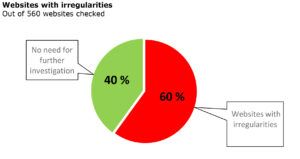The consumer websites examined across the EU show that many consumers encounter unclear information about prices and discounts when they shop online.
The European Commission and the national consumer protection authorities recently published the results of a detailed EU-wide review of 560 e-commerce sites offering a wide variety of products, services and digital content, such as clothing or footwear, computer programs or tickets for shows. Nearly 60% of these websites had irregularities in relation to EU consumer protection regulations, especially in terms of the way in which prices and special offers are presented.
In more than 31% of the websites that offered discounts, the responsible authorities of the consumers saw indications that the special offers were not authentic or discovered that the way to calculate the discounted price was not clear.
On 211 websites the final price at the time of payment was higher than the initial price offered. In 39% of these websites, merchants did not include adequate information on mandatory commissions added to the delivery, payment methods, booking fees and other similar surcharges. The EU consumer protection legislation requires traders to submit prices that include all mandatory costs, and when these costs can not be calculated in advance, they must at least clearly inform the consumer of their existence.
Other irregularities in relation to the information requirements:
- In 59% of the 560 websites examined, merchants violated the obligation to provide an easily accessible link to the online dispute resolution platform (RLL), which is mandatory under EU law. The RLL platform allows consumers and merchants to resolve disputes without going to court.
- In almost 30% of the websites there were irregularities related to the way of presenting the information on the right to withdrawal of consumers. According to EU legislation, consumers must receive clear information about their right to cancel the purchase when they buy online.
Next stages
The authorities responsible for the protection of consumers shall ensure full compliance of the merchants involved by activating their corresponding national coercive procedures when necessary.
Context
A systematic examination of websites across the EU (a “sweep”) is a set of checks that consumer protection authorities carry out simultaneously in different countries. These checks show whether traders respect EU legislation on consumer protection. When the checks highlight potential breaches of EU consumer protection legislation, the consumer protection authorities contact the companies involved and invite them to make corrections.
The previous “sweeps” focused on the following areas: airlines (2007), mobile content (2008), electronic products (2009), online ticket sales (2010), consumer credit (2011), digital content (2012) ), travel services (2013), guarantees on electronic products (2014), Directive on consumer rights (2015), comparison tools in the travel sector (2016) and telecommunications and other digital services (2017).
More information
Access to the complete news
Related publication: Consumer markets scoreboard: Making markets work for consumers: 2018 edition







Leave a Reply